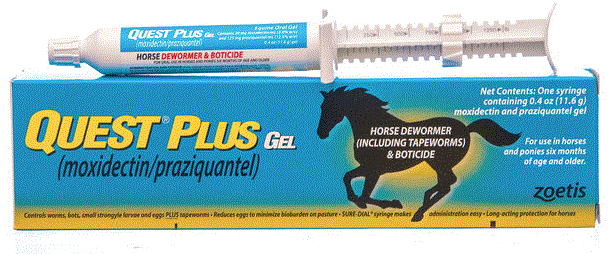Deworming is an important aspect of the equine health management plan. The practice of deworming involves administering an anti-parasitic drug to a horse, which will kill parasites within the horse, and clear the parasites from the horses’ body. This is important for maintaining the horses’ health, since internal parasites can cause problems such as weight loss, lethargy, colic symptoms, diarrhea, distended abdomen, and general poor condition.
While deworming has long been in practice, there have been some significant changes in how it is implemented over the past few decades. At one time, the standard method of deworming horses simply involved administering an anti-parasitic medication on a regular basis, from as frequent as once monthly, to once yearly. In some regions, the parasites became resistant to certain anti-parasitic drugs, which made controlling internal parasites more difficult. It was reasoned that this resistance may have been caused by unnecessary and non-judicious use of anti-parasitic medications, in situations where the horses’ parasitic burden was low or non-existent.
The current recommended approach to deworming horses is more of an evidence-based approach. The mainstay of this approach is to perform a test, called a Fecal Egg Count, to determine the parasite load of a particular horse prior to giving an anti-parasitic drug. This approach allows us to avoid needlessly using an anti-parasitic drug in horses that do not require deworming, thereby reducing the exposure of anti-parasitic drugs to parasites, leaving less of a chance to breed drug-resistance in parasites. A fecal egg count can also be performed after an anti-parasitic drug is administered (typically 14 days), to measure the decrease in fecal egg count, and the effectiveness of the treatment. This is called a Fecal Egg Count Reduction Test.
The typical parasite prevention protocol will include a fecal egg count in the spring, as well as an additional fecal egg count in the fall. From these counts, the individual horse can be categorized as a low, medium, or high shedder of parasite eggs, which is directly correlated with their parasite load. If the horses’ spring egg count is negative, or low, deworming is likely not necessary. If the egg count is high enough to warrant deworming, an appropriate anti-parasitic drug will be recommended by your veterinarian. If the egg count is exceptionally high, then a Fecal Egg Count Reduction Test will be recommended as well.
In the fall, even if your horses’ egg count is low, deworming will be recommended. The reason for this is to combat gastrointestinal parasites called encysted small strongyles, tapeworms and stomach bots. These parasites will rarely be detected on a fecal egg count and the fall is the optimum time to treat for them. The only anti-parasitic drugs that are effective for encysted small strongyles are moxidectin, or fenbendazole (given once daily for 5 days). The only effective treatments for tapeworms are products that contain praziquantel, or a double dose of pyrantel pamoate. In the fall, it is advisable to treat with a macrocyclic lactone product, such as moxidectin, or ivermectin, which will treat for stomach bots.

Therefore, in the fall, a convenient way to cover all of the fall deworming concerns is to treat with a moxidectin/praziquantel product (Quest Plus).
Unless individual circumstances require otherwise, it is recommended to perform fall deworming after a ‘killing frost’ has occurred. A ‘killing frost’ is when ambient temperatures have been low enough to kill parasite eggs that are present in the horses’ environment. This helps to ensure that re-infestation with parasites does not occur over the winter.
It is recommended that accurate dosing of anti-parasitic drugs is performed. This can be ensured by always using a weight tape to estimate the weight of a horse, and then giving the proper dose of drug by weight.
It is also important to make the best effort to rotate the drug used to deworm horses. This helps to reduce constant exposure to a particular drug, and reduces the chance of breeding drug resistance in the parasites. It is recommended for owners to keep careful records of deworming products used, so a strategic rotation of anti-parasitic drugs can be used.
Information gained from the fecal egg counts performed on an individual horse can help your veterinarian decide on the deworming protocol that is best for your horse. In some cases, your veterinarian may even recommend additional fecal egg counts throughout the year. Furthermore, this information can be gathered from several horses on a property and can be used to develop a herd deworming protocol. Some horses are more susceptible to parasites than others, and these horses will require more frequent deworming. Often, on a herd basis, about 80% of the parasites will reside in 20% of the horses. These 20% of horses, will then likely require more frequent deworming, while the other 80% will require less frequent deworming.
The modern approach to parasite management in horses utilizes fecal egg counts and fecal egg count reduction tests to determine the necessity for deworming, the effectiveness of the drugs used, and to tailor a deworming protocol to the individual horse or herd, all while providing the best approach to preventing drug resistance.
Written by Dr. Mackenzie Marks.
Learn more about Dr. Mackenzie Marks here.


